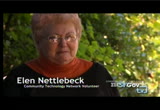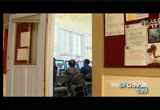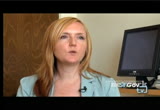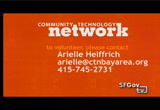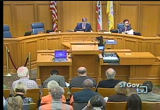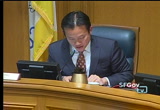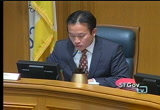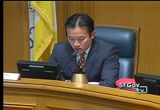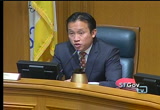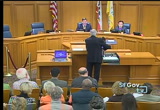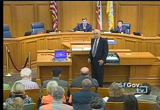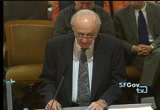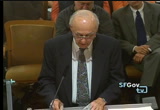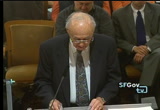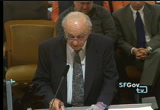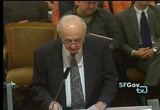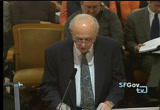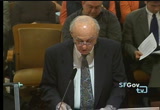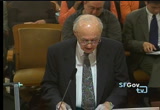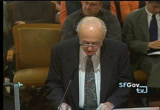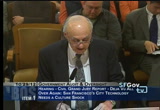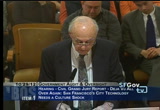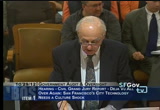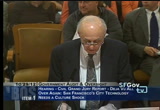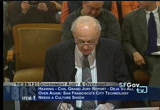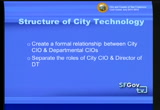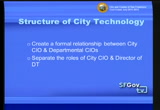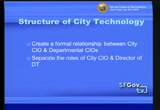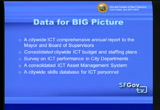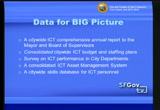tv [untitled] December 26, 2012 10:00pm-10:30pm PST
10:00 pm
important to everybody and possibly especially seniors to get enough of these skills to stay in touch. >> it's been fun. with seniors, to get them out of their homes. >> so they can connect with their family members. or their family members. >> [speaking in spanish]. >> so, what we focus on is transferring skills from volunteer to learner to help them get onto facebook, find housing in crisis, be able to connect with friends and family.
10:01 pm
>> i decided to teach what i learn and it made me want to give back. i discovered that seniors do a lot of review. >> i am a beginner, so, little by little i learn. i learn a lot now. >> if you get the basics, you can learn it. it's simple. it's easy. once you know it. and that's what i want to learn, how to make my life easier and more knowledgeable with the computer. >> so, what we need right now are more people who speak languages other than english or in addition to english who can give their time during the day and who care deeply ideally about helping to close the divide. >> it's a humbling experience. it's something simple to ask in our daily life, but to someone that doesn't know and to help
10:02 pm
somebody gain that experience in any way is awesome. >> [speaking in spanish]. >> no matter how tired or cranky or whatever i might feel, when i walk into this place i always walk out feeling great. >> if you feel comfortable using computers and you have patience, we want you on our team. >> would you show me how to type? >> [speaking in spanish]. >> will you help me learn more?
10:03 pm
>> all right. we're on. apologies for the difficulties and i want to welcome everyone to the special meeting of the government audit and oversight committee today on monday october 29 here in the city and county of san francisco home of the world series champions giants. i am supervisor mark farrell. i am the chair of the committee and joined by supervisor chiu and will be joined by supervisor elsbernd. i want to thank the staff for covering today's meeting. madam clerk do we have any announcements? >> yes. please make sure to silent any electronic devices and items acted upon today will
10:04 pm
be on the agenda anyplace otherwise stated. q. can you do item one and two together please? >> item one is a hearing and resolution and "deja vu all over again: san francisco's technology needs a culture shock." >> thank you very much. president chiu. >> thank you mr. chair. i wanted to make a couple of introductory comments and thank you for taking part in this hearing and in particular i want to thank the civil grand jury report for looking at this topic. i decided to bring with me today these folders. these folders represent all of the documents i have been looking at in the last couple of years on this specific topic and in particular let me just title a couple of the reports i have on this. from 2002 from the former executive director from dits, which is the predecessor agency to the department of technology
10:05 pm
and proposal for management and resources. then go a couple years later the civil grand jury report looked at our technology with hospital "pot holes or possibilities" and a year later the city controller had a letter and said they needed to improve service and performance measures. after that our city analyst did a management audit into their practices and two years later a another analyst looking into the city's purchasing process and many pages devoted to this and i think the report deja vu all over again is in fact and i would include "ground hog day or year". all of the reports said
10:06 pm
the same thing over and over again and those that have been focused on the it issues in the city knows this and we have departments doing the same thing when we ought to have one centralized department focused on these efforts. i think as folks know we have for years 70 system when is we ought to have a one and dozens of data centers when we ought to have one and when we have a streamlined and smaller agreement scpis could go on and on as you know. we identified these problems over the decade and somewhat can't solve them as the civil grand jury report pointed out we have a budget that is pushing $250 million i continue to be told by city staff and vendors that we could save tens of millions of dollars and be more efficient if we manage our
10:07 pm
information technology. now i do hope that today's session is an opportunity to talk about good and creative ideas. one of the phenomena i have seen is frankly a lot of finger pointing at different departments and who is at fault, and i think it's important to think why we got to this place, but what is the road map that is going to change thins? i know there are some that hope if and when we hire a new cio will change things and i want to note we had four individuals in those positions in the last ten years and not much as changed. the structure of how we govern ourselves from a it standpoint has not changed significantly and i am eager to hear the presentation from the civil grand jury report and again i thank you for your due diligence and hard work and i look forward to the conversation. >> thank you supervisor chiu for those remarks and welcome back
10:08 pm
to version two or three of this year. i also want to thank the other departments overing potential response focus we need them and others will speak as well and i would like to invite you up to share your report. >> good afternoon supervisors. on behalf of the civil grand jury i am marty choy and i person on this report and i will turn it over to the chair of the investigative committee. thanks. >> thank you. >> welcome back. >> we always seem to be getting together to celebrate the day after the giants have done something spectacular. it makes it difficult to prepare for these reports as a result of that but i would like to make a brief stop and -- didn't stop
10:09 pm
your remarks to supervisor chiu. you made our report for us and i thank you for many of the comments we will reiterate as part of the formal report, but to thank i would like to thank chairman farrell and president chiu for giving us this opportunity to sort of fill in a little bit of the things that we really think are important to state publicly about what we have found and what we think is wrong in technology. i would like to thank also the members of the civil grand jury who are here. i feel at home and with a meeting of with you all here and need a roundtable and everybody else and always neat in private and if you for that and i would like to thank the participants
10:10 pm
that met with us individually and together to discuss their proposals and the future. the title of "deja vu all over again: san francisco's technology needs a culture shock." reflects a history that we uncovered within city government t appears from the responses that we got from city administrators and some department heads no matter who says it or how many times it's said major changes to how technology is organized, managed and evaluated remains mired in a self protecting culture demonstrated at the highest level of city administrators and by some leaders of major departments. this we find has lead to continuous unnecessary costs, unnecessary duplication of services and unnecessary inefficiencies. it doesn't have
10:11 pm
to be that way. our past city cio has we have heard, the city budget analyst and another budget report, pafl civil grand jury and now this grand jury has each reached similar changes to how technology is organized and managed to remedy this situation so far to no avail. it came as quite a shock last week to receive the responses to our report from the office of the mayor signed by him and his top managers. their assertion that the structure employed by the -- by the city for technology quote insures coordination and efficiency while preserving department autonomy closed
10:12 pm
quote. that flys in the face of history and it flys in the face of reality. this coordination and efficiency the result of 15 year old justice project with its way over blown budget and continuously blown schedule and still not fully implemented, the coordination and efficiency snail pace to mix these email systems within a single government which shouldn't have proliferated in the first place. email consolidation began years ago and today many departments have joined in the consolidation but that is 4,000 of the 23,000 city users, 17%. another 11 departments with 12363 users to be somewhat precise or about 54% are now equalled to join in
10:13 pm
this consolidation. however, 14 departments with more than 7,000 users with 30% are not even scheduled to join the consolidation, and from our interviews some are considering whether or not to participate at all. this coordination and efficiency found in the emerge project that began in february 2009 with a phase one completion target of february february 2010. it was transferred from human resources to the controller's office because it was stalled. phase one went live in august 2011. the controller's office and the city ought to be complemented for that. however phase one, phase two and phase three were originally scheduled to be completed in me 2011. now scheduled to 2013. the
10:14 pm
coordination and efficiency found apparent department confusion for radio equipment and systems as discussed at the most meeting a few days ago. mta is planning move forward with its plans to replace its analogue radios. that surpleasely brought up other departments interest in replacing their radios including bay web, the public safety system. where is the coordination that mayor and staff boasts about that would have reprented this at the meeting? that begs the question are we headed to seven independent systemsalla email and who can predict that? the city is moving to replace the 25 year old famous system. if you like what you saw with the programs just mentioned think what you can look forward to. how much wasted money, time,
10:15 pm
and efficiencies have these and other snail paced projects cost? how much more will san francisco has to endure before serious change is made? i ask you as members of the board of supervisors should the city consider improvements to the structure and system that allows this waste to continue over and over? is it appropriate to consider the five year ict plan, which by the way was born through the 2010 efforts of the board of supervisors, and do you consider it a strategic plan as the office of the mayor is, when it is primarily in the current form s a project by project instrument and only where new money is concerned. what city wide values are incorporated that provide the backbone for a city strategy? where is the strategy for the future or even the present? there is little strategic that we found of the
10:16 pm
office of the mayor states there is no scarcity of data even with city technology. is it considered sufficient to do it on a city wide basis and not on a city view. there is no analysis where cost savings would come department to department or the city as a whole in the data presented. when a project boasts of cost savings with data consolidation there is no way of determining who or where the estimated $3 million was saved or what became of it. shame on you that says that the current structure ensures coordination and efficiency. what it does ensure is the status quo. it ensures the behavior of department technology. it ensures the lack of cooperation. what the office
10:17 pm
of the mayor response does is prove our recommendations are worthy of serious considerations by the board of supervisors. we are here today to share our views with the board of supervisors, the only body within city government that we're aware of that has been willing to step up in recent times as you did in 2010 by mushing through changes in the city's administrative code that attempt to introduce positive improvements to the way technology is practiced around here. today we ask you as members of the board of supervisors if you're satisfied with the implementation of those changes you made to the role of city cio and the five year plan? are you satisfied that these changes are moving technology sufficiently forward within city government? if you are then things will stay the same around here. the office of the mayor accuses the civil grand jury of
10:18 pm
not knowing much about technology in the city. yes, we start friday scratch but we spent a year learning directly from the leaders within city government within technology units throughout the city. we had some help since two of our five member investigation team are seasoned technology professionals. we interviewed more than 40 employees and elected officials, quite a few several times. we believed there was a good deal of candor in those interviews. not as much in the responses we're sorry to say. we did a great deal and discuss what we found with people in city government. we prepared findings and conclusions in the form of recommendations. every finding in our report was verified with additional interviews with the people providing that
10:19 pm
information. our report is factual, not fission. we believe. >> >> that city technology protects the status quo and at thes expense of cost savings and eliminating unnecessary duplication and at the expense of inefficiencies and xengs of cooperation among units that can lead to additional improvements. today there is no apparent leadership within san francisco to make important city wide changes happen efficiently and effectively as the samples i have given show. there is no ekz organization structure that sorts out what changes to make or manages how to make them. coit and the city cio do not venture in that realm. if not them, whom? the mayor claims he
10:20 pm
-- innovation mayor or technology may or as his response to our report claims but that reflects his priority and attracting tech companies to san francisco or having his staff work on apps that are helpful. he does little to improve the technology at home within his city government. the mayor has had hand on's experience as the execute administrative officer and the head of ddw. perhaps that experience has been him in the experience of this and i hope he considers technology an integral part of city operations that needs to and can be improved.
10:21 pm
that city technology is a significant priority for him and his staff. perhaps you, the board of supervisors, can help or it's deja vu all over again. you've had our report. rather than present each finding and recommendation, though each is important, and we stand by them, we believe it is best to highlight just those items we find most significant in terms of organizational structure, the needs for easily accessible information and about hiring. first let's deal with structure the most important component to
10:22 pm
10:23 pm
exists. no changes is offered. what is missing is the means to provide for the other needs those related to city wide government programs. here coordination and communication are vital if costs and duplication are to be managed. this is the area that needs fixing. the office of the mayor seems to believe what we're asking are a formal tie between the city cio and technology, leadership within departments for common city wide activities already exists as is stated in the response. has he or his staff really talked to the department -- really talked with department technology leadership or the city cio about this? we did. much more than one time and with much more than one person. it does not exist. the mayor's office says it exists not only in technology, but in
10:24 pm
such city wide services as finance, human resources and contracting. we would add capital planning and others. these are services the mayor states which are managed by the them and the central agency but that is not the case with technology as the may or's office believes. they choose the candidates they want to hire but work under the policies of hr. they have people working on personnel managers but not in the way leaders perform the role independent of the city cio or td. departments spend money but make sure they don't ignore what the controller requires. there are people that work on budgets and spending but again not with the same independence and control as department technology leaders do and so on.
10:25 pm
departments expect to be guided by the controller with clear direction and evaluated with consequences for non complying. that's not what we found the expectations are for technology. that is pretty much what we're asking for technology on city wide related matters. it doesn't exist now. the city cio doesn't have the authority of the controller rks the head of hr and so on. if he does he should be told because he doesn't act that way and departments don't view him that way. certainly the cio should have that authority for technology matters city wide to provide direction, coordination and communication. if the mayor thinks that the city cio should have that authority and already does he should check it out and make sure it's there and functioning. if he finds it's not there he should require it be done. it would make a world
10:26 pm
difference and that requires a strong capable cio as it does a controller or head of hr or purchasing or capital planning. beyond that the role of the city cio and the role of dt need to be separated into two positions. dt reporting to the city cio. the role of the city cio is to create a clear vision for technology city wide, develop strategies with departments for new projects, and implementing what has been approved. he should be concerned with integrating and cord naided interdepartment activities. dt on the other hand focuses on daily operations that are shared throughout the city. combining these two roles causes confusion, particularly over the role city cio and in combination it's too much for one person to
10:27 pm
do properly. information -- pardon me for a moment. our report points out specific deficiency in how dat is gathered, organized and presented. one example is reflected in budget reports. while budgets are made on a department by department basis there is not a complete agreement on certain definitions. for example, where does one budget for radio systems? not in technology. as a result the controller presented a city budget for technology of just under $200 million. through our interviews with technology leadership we were told that amount is under estimated by ten to 20% or more due to the differences of what to include. actual expenditures presented more difficult picture. some
10:28 pm
departments use non technology people to perform technology assignments and hiding the expenses outside of technology. actual cost of city wide projects are blurred as the examples shows. no one knows for sure how much is being spent, how much is being saved. without comprehensive information there is no way to evaluate the success of ict city wide consolidations. we found no analysis where cost savings would come from from department to department or any of the consolidations. isn't there a reason to evaluate them on an ongoing basis? for that focused data is needed. it's not done now. either is a data base for personnel city wide and match needs with talent and ability. we don't do that because we
10:29 pm
don't look at technology as important city wide service. we propose the introduction of city wide annual report to the mayor and the board of supervisors. at the last meeting the mayor's representative endorsed an idea like this. we applaud that. it needs to happen. we proposed a consolidated city wide budget and staffing plans, and if my slides work correctly, you can read that what your administrative code requires. it's not necessarily what is presented. without comprehensive information there is no way to evaluate the success of ict city wide consolidations. we found no real analys
175 Views
IN COLLECTIONS
SFGTV: San Francisco Government Television Television Archive
Television Archive  Television Archive News Search Service
Television Archive News Search Service 
Uploaded by TV Archive on

 Live Music Archive
Live Music Archive Librivox Free Audio
Librivox Free Audio Metropolitan Museum
Metropolitan Museum Cleveland Museum of Art
Cleveland Museum of Art Internet Arcade
Internet Arcade Console Living Room
Console Living Room Books to Borrow
Books to Borrow Open Library
Open Library TV News
TV News Understanding 9/11
Understanding 9/11